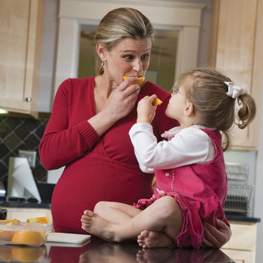Maybe your diet needs some improvement or you already eat pretty healthfully. But once you discover you’re pregnant, your nutritional intake becomes even more important. How much and what types of food should you eat to help ensure a healthy baby? What nutrients are particularly important? And what’s the best way to eat after the baby arrives? Read on for a brief overview of what every mommy-to-be - and new mommy - should know about maternal nutrition. (If you have any specific questions about what you should be consuming during or after carrying a baby, talk to your doctor.)
 Before and During Pregnancy: Eating for Two
Before and During Pregnancy: Eating for Two
The best way to prepare your body for pregnancy is to eat healthfully before you become pregnant, says registered dietitian Roxanne Moore. “There are key nutrients that help keep your body strong and healthy pre-pregnancy,” says Moore. “It’s important to increase your consumption of fruits and vegetables, and whole grains, breads and cereals to make sure that you’re getting adequate amounts of folic acid. You also want to make sure you’re getting adequate amounts of protein and supply your body with adequate iron stores.”
Once you’re pregnant, it’s important to eat sufficient calories to support you and your growing baby, but many pregnant women wind up going overboard, which translates into extra pounds to lose post-delivery. On average, you only need an extra 300 calories a day. It’s also a good idea to take a prenatal vitamin supplement, especially if you suffer from morning sickness or lack of appetite.
One easy way to ensure good nutrition is to focus on minimally processed, whole foods, says registered dietitian Elizabeth Somer, author of Nutrition for a Healthy Pregnancy, Second Edition (Henry Holt, 2002). Opt for unprocessed foods and eat lots of fruits and vegetables. “If you can get eight to 10 servings of fruits and vegetables, you’re doing really well,” says Somer. “Those are the foods on which healthy babies are built, so include two fruits and veggie servings at every meal.”
Up your intake of whole grains and choose more nutrient-dense foods like brown rice over white, whole wheat over white bread and shredded wheat cereal over presweetened varieties. Shoot for a minimum of six servings of grains a day, and make sure to consume at least three servings of calcium-rich foods every day. “You’re not only building up your own supply for your bones, but you’re building bones for your baby as well,” says Somer. Choose lean sources of protein like chicken breast, extra lean beef or refried beans to help you get enough iron and zinc, two important minerals.
For a healthy weight gain, space your calories out throughout the day. “Eat when you’re comfortably hungry because you stay in control of your eating habits, and make smart choices,” says Somer. “Once you’re ravenous, you’ll eat anything.”
Finally, make sure that you’re taking in sufficient fluids. You should be drinking at least 64 ounces of fluid a day - anything non-caffeinated and non-alcoholic, such as milk, juice and water counts toward this total.
Post-Delivery: Eat for Strength and Energy
After delivering a baby, good nutrition is as important as ever. “This is not the time to starve yourself. This is not the time to diet,” says Moore. “You need your energy reserves, especially when you’re breast-feeding.” If you’re breast-feeding, you’ll need about 500 extra calories a day to produce milk for your infant.
Good nutrition will also help you keep your immune system strong. “It’s important to still maintain a high intake of whole grains and fruits and vegetables, and ensure you’re getting adequate amounts of protein,” says Moore. “You need to give yourself time to recuperate from the pregnancy process as well. Your body needs some healing time and the way to heal is through good nutrition.”
“You’ve done the equivalent of running a marathon for the last nine months,” agrees Somer. “Even if you’ve eaten really well, you still need to recuperate nutritionally and build back the stores that have been used to build a baby. I consider that first year after the baby’s born as a chance to nutritionally nurture your body and bring it back up to speed.”
That means continuing to eat lots of fruits and vegetables, whole grains, lean protein sources, dairy products and drinking plenty of fluids. If you’re breast-feeding, your diet is even more critical - the nutrients you eat are passed along to your baby. Make nutrient-loaded choices, and limit sweets, chips, fatty foods and other junk food.
Regardless of whether you breast-feed or not, resist the urge to slash your caloric intake to lose weight. If you eat healthfully, your baby weight will come off slowly without having to resort to a crash diet. It’s a good idea to maintain these healthy eating habits even after you’ve recovered from giving birth - one in two pregnancies is unplanned. Good nutrition will set the stage for a healthy baby next time around as well.
Freelancer and mom Kelly writes about health, fitness and nutrition.
Calgary’s Child Magazine © 2024 Calgary’s Child